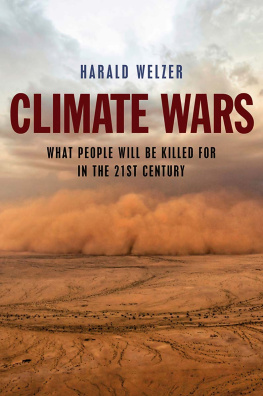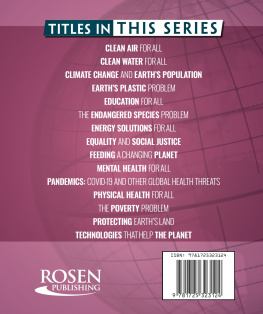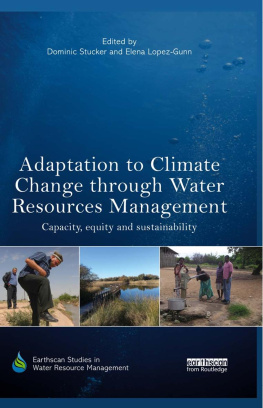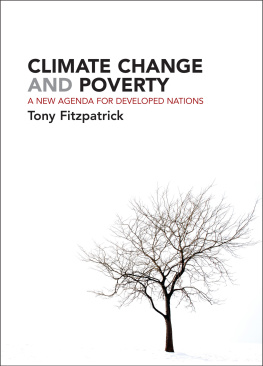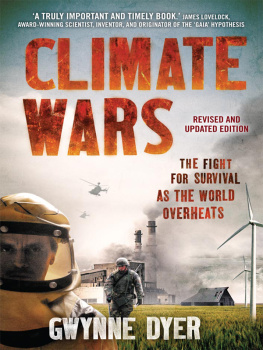
CLIMATE WARS
WHY PEOPLE WILL BE KILLED IN THE TWENTY-FIRST CENTURY
HARALD WELZER
TRANSLATED BY PATRICK CAMILLER
polity
First published in German as Klimakriege: Wofr im 21. Jahrhundert gettet wird S. Fischer Verlag GmbH, Frankfurt am Main, 2008.
This English edition Polity Press, 2012

The translation of this work was supported by a grant from the Goethe-Institut which is funded by the German Ministry of Foreign Affairs.
Polity Press
65 Bridge Street
Cambridge CB2 1UR, UK
Polity Press
350 Main Street
Malden, MA 02148, USA
All rights reserved. Except for the quotation of short passages for the purpose of criticism and review, no part of this publication may be reproduced, stored in a retrieval system, or transmitted, in any form or by any means, electronic, mechanical, photocopying, recording or otherwise, without the prior permission of the publisher.
ISBN-13: 978-1-5095-0163-2
A catalogue record for this book is available from the British Library.
The publisher has used its best endeavours to ensure that the URLs for external websites referred to in this book are correct and active at the time of going to press. However, the publisher has no responsibility for the websites and can make no guarantee that a site will remain live or that the content is or will remain appropriate.
Every effort has been made to trace all copyright holders, but if any have been inadvertently overlooked the publisher will be pleased to include any necessary credits in any subsequent reprint or edition.
For further information on Polity, visit our website: www.politybooks.com
Contents
Guide
Pages
ACKNOWLEDGEMENTS
The idea of writing a book about the link between climate change and violence goes back to the run-up to the Year of the Humanities in 2007, the eighth in a series of years officially named in Germany for a branch of the sciences. When the weekly newspaper Die Zeit asked me to submit a programmatic text on the future of social and cultural theory, I took it as a welcome opportunity for an appeal that colleagues should pay greater attention to the far-reaching changes taking place in the life of society. What we today call climate change , I wrote there, will be the greatest social challenge of the modern age, especially since there will be no way of escaping the question of how to cope with the masses of refugees who can no longer survive in their land of origin and wish to enjoy the opportunities available in better-off countries. We know from the study of past genocides how quickly an attempted solution to social problems can turn into sweeping definitions and deadly actions, and whether societies can avoid such things is a test of their ability to learn from history. Those lines, written with a certain ardour, soon turned into a strange challenge to carry my thinking further. So, in fact it was Elisabeth von Thadden at Die Zeit who gave the first impetus for Climate Wars. A further major stimulus was my collaboration with Tobias Debiel on a Failing Societies project, in which I learned a great deal about the subject of our research. Some of the graphics in the present book originated in the hugely important journal Globale Trends, which Tobias Debiel edits together with Dirk Messner and Franz Nuscheler and for these too I am deeply grateful. Many other individuals made their research available to me: Scharsad Amiri, Karin Schrmann, Jacques Chlopzyk, David Keller, Christian Gudehus, Bernd Sommer, Alfred Hirsch and above all Sebastian Wessels deserve my thanks here for their time, effort and commitment. My gratitude too to Romuald Karmakar for discussions and suggestions. The Kulturwissenschaftliches Institut in Essen, especially in the persons of Claus Leggewie, Ludger Heidbrink, Jrn Rsen and Norbert Jegelka, offered me not only the inspiring collegial atmosphere one needs for such a hazardous project as Climate Wars, but also many occasions to discuss and try out various themes and ideas. Special thanks are due to Dana Giesecke, who painstakingly contributed to the book with intensive research, editing and indexing, and whose gentle criticism spared the reader many a redundancy or rhetorical flourish. Her constant involvement was a source of infinite help. And, finally, my thanks to my trusted publishers, Peter Sillem, Anita Jantzer and, above all, Heidi Borhau and Walter Pehle.
1
A SHIP IN THE DESERT: THE PAST AND FUTURE OF VIOLENCE
A slight clinking behind me made me turn my head. Six black men advanced in a file, toiling up the path. They walked erect and slow, balancing small baskets full of earth on their heads, and the clink kept time with their footsteps. [] I could see every rib, the joints of their limbs were like knots in a rope; each had an iron collar on his neck, and all were connected together with a chain whose bights swung between them, rhythmically clinking.
This scene, from Joseph Conrads Heart of Darkness, is set in the heyday of European colonialism, a little more than a hundred years ago.
The pitiless brutality with which early industrial countries satisfied their hunger for raw materials, land and power, and which left its mark on whole continents, cannot be seen in the landscape of the West today. The memory of exploitation, slavery and extermination has succumbed to democratic amnesia, as if the countries of the West had always been as they now are and their superior wealth and power were not built upon a murderous history.
Instead, the West prides itself on its inventiveness, its observance and defence of human rights, its political correctness and humanitarian stance when a civil war, flooding or drought threatens human life in some part of Africa or Asia. Governments order military intervention to spread democracy, overlooking that most Western democracies rest on a history of exclusion, ethnic cleansing and genocide. Whereas the asymmetrical history of the nineteenth and twentieth centuries has translated into luxurious living standards in Western societies, its violence still weighs heavily on many parts of the second and third worlds. Quite a few post-colonial countries have never made it to real statehood, let alone achieved prosperity; many have continued to experience the old exploitation under different conditions, and the signs often point towards further decline rather than significant improvement.
Climate change resulting from the insatiable hunger for fossil fuels in the early industrial countries hits the poorest regions of the world hardest a bitter irony that flies in the face of any expectation that life is fair. shows the remnants of the Eduard Bohlen steamer, which were dug up after almost a hundred years from the sands of the Namibian desert. It played a minor role in the history of major injustice. On 5 September 1909, it ran aground in thick fog off the coast of the country that was then called German South-West Africa. Today the wreck lies 200 metres inland, the desert having gradually inched its way out to sea in the intervening period. Since 1891 the Eduard Bohlen had made regular stops in South-West Africa, carrying mail for the Woermann Lines based in Hamburg. But during the German colonial war against the Herero people, it was converted into a slave ship.
Next page
